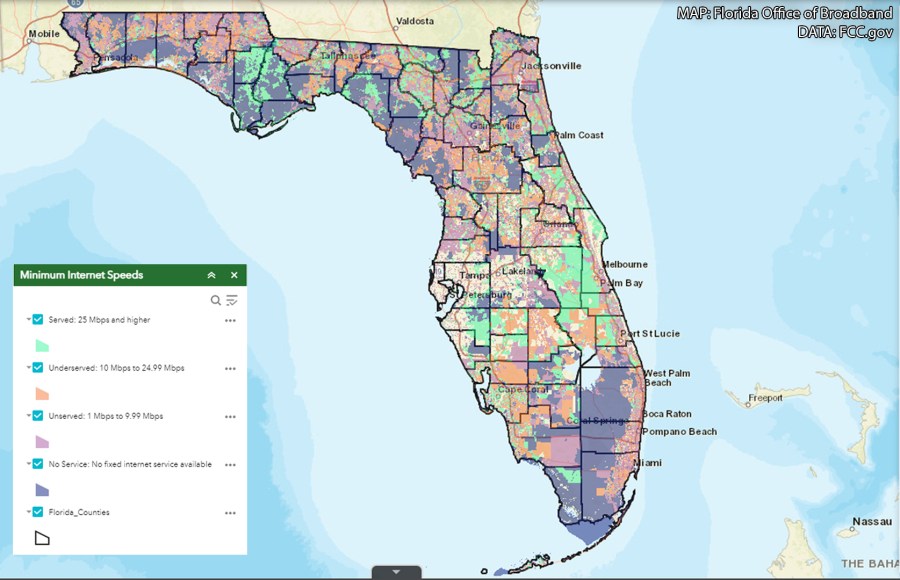TALLAHASSEE, Fla. (WFLA) – During a Friday night bill-signing run, Florida Gov. Ron DeSantis signed House Bill 1239 into law, giving internet companies in Florida more opportunities to expand and provide connections to underserved or unserved communities.
HB 1239 is a step toward getting internet access for all residents of Florida. The COVID-19 pandemic has shown how important having internet access is, as a national debate on the nature of infrastructure continues. Access to broadband has become an increasingly important factor in the American workforce, as well as education.
Called the “Florida Broadband Deployment Act of 2021,” the new law makes changes to how the Florida Office of Broadband works, and commits a one-time appropriation of $1.5 million to develop maps of broadband internet service across the state.
The importance of internet access is written into the law itself and acknowledged by the legislature:
“The Legislature finds that the sustainable adoption of broadband Internet service is critical to the economic and business development of this state and is essential for all residents of this state, libraries, schools, colleges and universities, health care providers, and community organizations.”
CS/CS/HB 1239.
A new broadband grant program
To help expand internet access to parts of the state that are currently unserved, the new law creates the Broadband Opportunity Program.

Data provided by the Federal Communications Commission to the Florida Department of Economic Opportunity shows that there are large chunks of the state with little or no internet access.
The Broadband Opportunity Program was created by the law to provide funding opportunities through grants to applicants who are working to expand broadband service to unserved areas of Florida.
The Florida Office of Broadband is now required by law to administer and act as the fiscal agent of the program to receive and review grant applications, then award them, to fund installation of broadband support infrastructure. Grants that are awarded for this program cannot be used to install or deploy broadband service to areas that already have at least one provider, instead they are focused solely on providing internet service to areas that currently have none.
Applicants for the grants include corporations, limited liability companies, political subdivisions and Indian tribes in Florida. Government entities are not allowed to receive grants from the program, directly or indirectly. Educational institutions and their affiliates are also prevented from receiving grants for broadband service for use at commercial premises unless other service providers are not working in the unserved area.
Grant applicants will have to provide the state with a description of the project area, the amount of broadband infrastructure proposed, and demonstrate evidence of the unserved nature of the project area to justify the grant applications. They’ll also have to show how many households and businesses would have access as a result of the grant, and provide a list of significant community institutions that would benefit.
Awards from the grant program cannot exceed $5 million for a single project.
Additional internet infrastructure
Infrastructure for internet service is also seeing some adjustment in the law, with a new statute created to allow for attaching broadband facilities to municipal electric utility poles as a way to increase availability of access throughout the state.
“The lack of internet connectivity and widespread broadband availability is detrimental to the growth of the economy, access to telehealth, and educational opportunities,” the law reads.
To that end, some federal funds will be used by the state to address inadequate or non-existent service in parts of Florida, and requires that broadband service in the state has a minimum rate of 25 megabits per second for download, and at least 3 megabits per second for upload.
The law takes effect July 1. From that date, broadband providers will be able to receive a promotional $1 per wireline attachment per pole rate each year for any new attachments that are needed to provide broadband in unserved or underserved users within a municipal electric utility service territory.
Florida’s new broadband law is a step toward expanding access for all Floridians, and is just one of several efforts to increase internet access as state legislatures and federal initiatives are proposed to fill gaps exposed by the COVID-19 pandemic.
Check out the full language of the law here:






